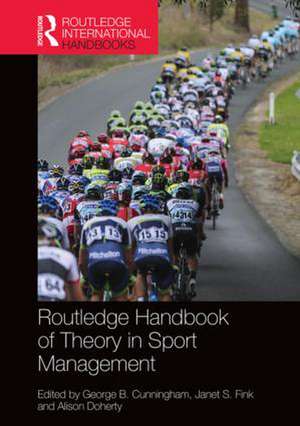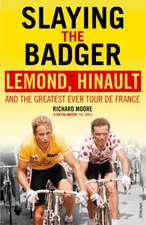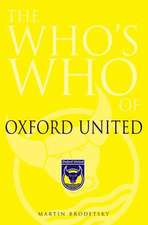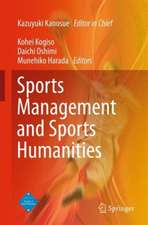Routledge Handbook of Theory in Sport Management: Routledge International Handbooks
Editat de George B. Cunningham, Janet S. Fink, Alison Dohertyen Limba Engleză Hardback – 26 oct 2015
Written by a world-class team of international sport management scholars, each of whom has taken a leading role in developing a particular theory or framework for understanding sport management, the book covers the full span of contemporary issues, debates, themes and functional approaches, from corporate social responsibility and diversity to strategy, marketing and finance. Every chapter explores a key theoretical approach, including an overview of that theory, a discussion of the process of theory development and of how the theory has been employed in research, practice or teaching, and outlines directions for future research in that area. Each chapter includes cases and examples, as well as short illustrative commentaries from people who have used that particular theory in their work, and attempts to highlight the theory-practice links, or gaps, in that area.
For a fully-rounded understanding of what sport management is and how it should be studied, taught and practiced, a thorough grounding in theory is essential. The Routledge Handbook of Theory in Sport Management is therefore important reading for all advanced students, researchers, instructors, managers and practitioners working in this exciting field.
Din seria Routledge International Handbooks
-
 Preț: 371.78 lei
Preț: 371.78 lei -
 Preț: 375.50 lei
Preț: 375.50 lei -
 Preț: 362.20 lei
Preț: 362.20 lei -
 Preț: 352.09 lei
Preț: 352.09 lei - 9%
 Preț: 1487.73 lei
Preț: 1487.73 lei - 5%
 Preț: 317.32 lei
Preț: 317.32 lei -
 Preț: 372.05 lei
Preț: 372.05 lei -
 Preț: 361.20 lei
Preț: 361.20 lei -
 Preț: 390.14 lei
Preț: 390.14 lei -
 Preț: 311.91 lei
Preț: 311.91 lei - 9%
 Preț: 1488.70 lei
Preț: 1488.70 lei -
 Preț: 390.23 lei
Preț: 390.23 lei -
 Preț: 347.75 lei
Preț: 347.75 lei -
 Preț: 347.75 lei
Preț: 347.75 lei - 9%
 Preț: 1490.13 lei
Preț: 1490.13 lei -
 Preț: 356.23 lei
Preț: 356.23 lei -
 Preț: 348.29 lei
Preț: 348.29 lei - 5%
 Preț: 328.13 lei
Preț: 328.13 lei -
 Preț: 394.25 lei
Preț: 394.25 lei - 8%
 Preț: 392.90 lei
Preț: 392.90 lei - 8%
 Preț: 422.42 lei
Preț: 422.42 lei -
 Preț: 357.23 lei
Preț: 357.23 lei - 8%
 Preț: 421.97 lei
Preț: 421.97 lei - 5%
 Preț: 452.17 lei
Preț: 452.17 lei - 9%
 Preț: 1665.72 lei
Preț: 1665.72 lei - 9%
 Preț: 1651.64 lei
Preț: 1651.64 lei -
 Preț: 350.21 lei
Preț: 350.21 lei -
 Preț: 381.91 lei
Preț: 381.91 lei -
 Preț: 345.64 lei
Preț: 345.64 lei -
 Preț: 347.75 lei
Preț: 347.75 lei - 20%
 Preț: 1401.04 lei
Preț: 1401.04 lei -
 Preț: 342.77 lei
Preț: 342.77 lei -
 Preț: 346.78 lei
Preț: 346.78 lei -
 Preț: 345.17 lei
Preț: 345.17 lei -
 Preț: 353.89 lei
Preț: 353.89 lei -
 Preț: 1058.63 lei
Preț: 1058.63 lei -
 Preț: 348.06 lei
Preț: 348.06 lei - 5%
 Preț: 337.34 lei
Preț: 337.34 lei -
 Preț: 365.90 lei
Preț: 365.90 lei - 9%
 Preț: 1528.89 lei
Preț: 1528.89 lei -
 Preț: 346.12 lei
Preț: 346.12 lei -
 Preț: 392.49 lei
Preț: 392.49 lei - 9%
 Preț: 1454.53 lei
Preț: 1454.53 lei - 9%
 Preț: 1492.85 lei
Preț: 1492.85 lei - 5%
 Preț: 326.87 lei
Preț: 326.87 lei -
 Preț: 361.75 lei
Preț: 361.75 lei - 9%
 Preț: 1349.84 lei
Preț: 1349.84 lei - 19%
 Preț: 422.81 lei
Preț: 422.81 lei - 8%
 Preț: 385.56 lei
Preț: 385.56 lei
Preț: 1356.90 lei
Preț vechi: 1823.54 lei
-26% Nou
Puncte Express: 2035
Preț estimativ în valută:
259.68€ • 270.10$ • 214.38£
259.68€ • 270.10$ • 214.38£
Carte tipărită la comandă
Livrare economică 14-28 aprilie
Preluare comenzi: 021 569.72.76
Specificații
ISBN-13: 9781138803848
ISBN-10: 1138803847
Pagini: 432
Ilustrații: 7 black & white tables, 30 black & white line drawings
Dimensiuni: 174 x 246 x 28 mm
Greutate: 0.91 kg
Ediția:1
Editura: Taylor & Francis
Colecția Routledge
Seria Routledge International Handbooks
Locul publicării:Oxford, United Kingdom
ISBN-10: 1138803847
Pagini: 432
Ilustrații: 7 black & white tables, 30 black & white line drawings
Dimensiuni: 174 x 246 x 28 mm
Greutate: 0.91 kg
Ediția:1
Editura: Taylor & Francis
Colecția Routledge
Seria Routledge International Handbooks
Locul publicării:Oxford, United Kingdom
Public țintă
Postgraduate and UndergraduateCuprins
Section 1: Overview 1. Developing Theory in Sport Management 2. Importance of Theory in Quantitative Inquiry 3. Importance of Theory in Qualitative Inquiry Section 2: Managerial Theories 4. Developing a Theory of Suffering and Academic Corruption in Sport Applying a Theory of Academic Suffering and Academic Corruption 5. Building Theoretical Foundations for Strategic CSR in Sport Applying Strategic CSR in Sport 6. Stakeholder Management in Sport Organizations Applying Stakeholder Management Theory 7. Mega-sport events Applying the Theory of Mega Sport Event Legacies 8. Sport Policy Implementation Applying a Neo-Institutional-Translational Theory of Policy Implementation 9. Theory of Sport Policy Factors Leading to International Sporting Success (SPLISS) Applying the Theory of SPLISS 10. Developing a Theory of Board Strategic Balance Applying a Theory of Board Strategic Balance 11. The Conception, Development, and Application of Sport-For-Development Theory Applying Sport for Development Theory 12. Leadership Applying the Multidimensional Model of Leadership 13. Organizational Justice Theory Development Applying Organizational Justice Theory 14. Managing Diversity Applying the Theory of Managing Diversity 15. Work-Life Interface in Sport Applying Work-Family Conflict Theory 16. Sport and Sense of Community Theory Applying Sport and Sense of Community Theory Section 3: Marketing Theories 17. Sponsorship-Linked Marketing Applying Sponsorship-Linked Marketing Theory 18. Team Identity Theory Applying Team Identity Theory 19. Sport Consumer Behavior Applying the Sport Consumer Behavior Model 20. Brand Equity in Sport: Conceptualization, Advancement, and Extensions Applying the Brand Equity in Sport Model 21. The Psychological Continuum Model: An Evolutionary Perspective Applying the Psychological Continuum Model 22. Sport Fan Socialization: Becoming Loyal to a Team Applying Sport Fan Motivation Theory 23. What Attracts Fans to a Venue? Applying Sportscape 24. The Sports Product Applying The Sports Product Framework Section 4: Sociocultural Theories 25. The Gendering of Leadership in Sport Organizations: Poststructural Perspectives Applying the Three Tiered Approach to Male Dominance and Sex Segregation in Coaching 26. Inclusive Masculinity Theory Applying Inclusive Masculinity Theory 27. This Way…This Explains My Reality: Critical Race Theory in Sport And Leisure Applying Critical Race Theory 28. Gatekeeping and Sport Communication Applying the Gatekeeper Influence in Sport Communication Model 29. The Continuum Theory: Challenging Traditional Conceptualization and Practices of Sport Applying Sport Continuum Theory Section 5: Economic Theories 30. Balanced Scorecard Approach to Evaluating Events Applying the Balanced Scorecard Approach to Evaluating Events 31. Towards a New Theory of Sport Anchored Development for Real Economic Change Applying Rosentraub’s Economic Development Theories 32. Fort and Quirk: A Look Back and a Look Forward Applying Competitive Balance Theory Section 6: Conclusion 33. Themes and Directions for Theory in Sport Management
Recenzii
Selected as an Outstanding Academic Title (OAT) 2016 by CHOICE magazine.
"Cunningham (Ohio State), Fink (Univ. of Massachusetts, Amherst), and Doherty (Western Univ., Ontario, Canada) have produced a broad-reaching exploration of how major theories from disciplines outside sports—sociology, managerial and marketing sciences, economics, social and behavioral psychology, and so on—as well as theories endogenous to sport management have been adapted for and contribute to the advanced study of sport's industrial and social significance. The contributors, many of them top scholars in the field, look at how researchers might best interpret sport's unique interactions (economic exchange, marketing, communication), governance structures (stakeholdership, international policy), products (sport as brand, as good), sociocultural effects (producer of racial, gender, sexual identities), and identities (fan or organizational). The contributors not only make a compelling case for how theory can help scholars understand and operationalize sport's political, economic, social, and entrepreneurial significance but also demonstrate how social scientists can forge new lines of interpretation of sport. Though pricey, this is a requisite survey of social science theory as applied to the field of sport management.
Summing Up: Essential. Upper-division undergraduates through faculty." - J. Newman, Florida State University, in CHOICE
"Cunningham (Ohio State), Fink (Univ. of Massachusetts, Amherst), and Doherty (Western Univ., Ontario, Canada) have produced a broad-reaching exploration of how major theories from disciplines outside sports—sociology, managerial and marketing sciences, economics, social and behavioral psychology, and so on—as well as theories endogenous to sport management have been adapted for and contribute to the advanced study of sport's industrial and social significance. The contributors, many of them top scholars in the field, look at how researchers might best interpret sport's unique interactions (economic exchange, marketing, communication), governance structures (stakeholdership, international policy), products (sport as brand, as good), sociocultural effects (producer of racial, gender, sexual identities), and identities (fan or organizational). The contributors not only make a compelling case for how theory can help scholars understand and operationalize sport's political, economic, social, and entrepreneurial significance but also demonstrate how social scientists can forge new lines of interpretation of sport. Though pricey, this is a requisite survey of social science theory as applied to the field of sport management.
Summing Up: Essential. Upper-division undergraduates through faculty." - J. Newman, Florida State University, in CHOICE
Descriere
This is the first book to trace the intellectual contours of theory in sport management, and to explain, critique and celebrate the importance of sport management theory in academic research, teaching and learning, and in the development of professional practice. Covering the full span of contemporary issues, debates, themes and functional approaches, from corporate social responsibility and diversity to strategy, marketing and finance, each chapter explores a key theoretical approach, including an overview of that theory, a discussion of the process of theory development and of how the theory has been employed in research, practice or teaching, and outlines directions for future research.






